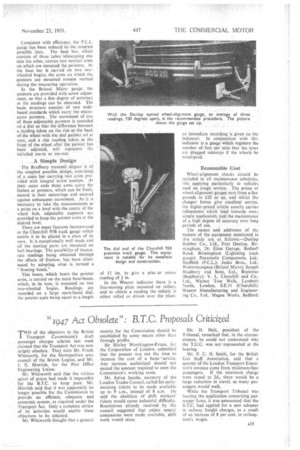1947 Act Obsolete": B.T.C. Proposals Criticized
Page 45

If you've noticed an error in this article please click here to report it so we can fix it.
TWO of the objectors to , the British 1 Transport .Commission's draft passenger charges scheme last week claimed that the Transport Act was now largely obsolete. They were Mr. Frank Whitworth, for the Metropolitan area council of the British Legion, and Mr. J. E. Morrish, for the Post Office Engineering Union. . •
Mr. Whitworth said that the vicious spiral of prices had made it impossible for the B.T.C. to keep pace. Mr. 1MOrrish said that it was apparently no longer possible for the Commission to provide an efficient, adequate and economic system, as required under the Transport Act. Only a complete review of its -activities would enable these objectives to be attained.
Mr. Whitworth thought that a general reserve for the Commission should he established by some means other than through profits. Sir Shirley Worthington-Evans, for the Corporation of London, submitted that the present was not the time to increase the cost of a basic-service. Any increase authorized should not exceed the amount required to meet the Commission's working costs.
Mr. Julius Jacobs, secretary of the London Trades Council, called for earlymorning tickets to be made available up to 9 a.m., instead of 8 a.m. 1-le said the abolition of shift workers' tickets would cause industrial difficulty. Resolutions already received by the council suggested that unless special concessions were made available, shift work would cease.
Mr. H. Hull, president of the Tribunal, remarked that, in the circumstances, he could not understand why the T.U.C. was not represented at the hearing.
Mr. F. C. H. Smith, for the British Gas Staff Association, said that a quarter of the London Transport Executive's revenue came from minimum-fare passengers. If the minimum charge were raised to 2d., there would be a large reduction in travel, as many passengers would walk.
While the Transport Tribunal was hearing the application concerning passenger fares, it was announced that the B.T.C. had applied for a new advance in railway freight charges, as a result of an increase of 8 per cent, inrailwaymen's wages.












































































